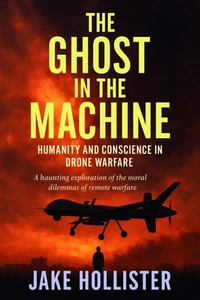The rise of drone warfare and remote surveillance has transformed modern conflict, placing unprecedented psychological stress on the men and women behind the controls. Eyes in the Sky, Shadows on the Mind delves into the mental strain, moral injury, and cognitive load experienced by operators who observe enemies from afar, make life-or-death decisions, and grapple with ethical dilemmas that can haunt them for a lifetime.
From aerial reconnaissance to advanced UAV operations and satellite monitoring, modern military and intelligence technology provides unparalleled visibility-but at a cost. Operators face emotional disconnect, hypervigilance, and isolation as they process vast amounts of information under extreme pressure. Decision-making under these conditions is relentless, and the burden of accountability weighs heavily, creating psychological consequences that extend far beyond the battlefield.
This book explores the delicate balance between operational efficiency and human fragility, showing how remote observation can dehumanize targets, distort perception, and leave operators wrestling with guilt and moral ambiguity. Drawing on real-world insights, psychological research, and first-hand accounts, it examines how cognitive load, fatigue, and emotional strain impact performance and decision-making.
Readers will gain a deep understanding of the unseen stressors behind technological surveillance and the invisible war waged within the minds of those tasked with constant vigilance. Eyes in the Sky, Shadows on the Mind is also a guide to resilience and coping strategies, offering insights into mental health support, mindfulness techniques, and long-term psychological recovery for those exposed to the pressures of remote warfare.
It addresses not only the operators themselves but also the global implications of technological surveillance, the ethical dilemmas of remote decision-making, and the collateral psychological effects on civilians and society at large. By weaving together the human stories behind drone warfare, the book highlights how modern technology shapes not just conflict but consciousness itself. It challenges readers to consider the moral and emotional cost of "seeing everything" and the responsibility that comes with wielding unprecedented observational power.
With themes of psychological stress, moral injury, cognitive load, ethical dilemmas, and mental resilience, this compelling exploration of remote warfare speaks to military professionals, policymakers, psychologists, and anyone intrigued by the intersection of technology, ethics, and human behavior. Whether you are interested in drone operations, remote surveillance, UAV strategy, or the psychological impact of modern conflict, Eyes in the Sky, Shadows on the Mind offers a unique and essential perspective on how technology, observation, and moral responsibility collide in the modern age.
Dive into a world where the eyes in the sky cast long shadows on the mind, and discover what it truly means to watch, decide, and endure from afar.
The rise of drone warfare and remote surveillance has transformed modern conflict, placing unprecedented psychological stress on the men and women behind the controls. Eyes in the Sky, Shadows on the Mind delves into the mental strain, moral injury, and cognitive load experienced by operators who observe enemies from afar, make life-or-death decisions, and grapple with ethical dilemmas that can haunt them for a lifetime.
From aerial reconnaissance to advanced UAV operations and satellite monitoring, modern military and intelligence technology provides unparalleled visibility-but at a cost. Operators face emotional disconnect, hypervigilance, and isolation as they process vast amounts of information under extreme pressure. Decision-making under these conditions is relentless, and the burden of accountability weighs heavily, creating psychological consequences that extend far beyond the battlefield.
This book explores the delicate balance between operational efficiency and human fragility, showing how remote observation can dehumanize targets, distort perception, and leave operators wrestling with guilt and moral ambiguity. Drawing on real-world insights, psychological research, and first-hand accounts, it examines how cognitive load, fatigue, and emotional strain impact performance and decision-making.
Readers will gain a deep understanding of the unseen stressors behind technological surveillance and the invisible war waged within the minds of those tasked with constant vigilance. Eyes in the Sky, Shadows on the Mind is also a guide to resilience and coping strategies, offering insights into mental health support, mindfulness techniques, and long-term psychological recovery for those exposed to the pressures of remote warfare.
It addresses not only the operators themselves but also the global implications of technological surveillance, the ethical dilemmas of remote decision-making, and the collateral psychological effects on civilians and society at large. By weaving together the human stories behind drone warfare, the book highlights how modern technology shapes not just conflict but consciousness itself. It challenges readers to consider the moral and emotional cost of "seeing everything" and the responsibility that comes with wielding unprecedented observational power.
With themes of psychological stress, moral injury, cognitive load, ethical dilemmas, and mental resilience, this compelling exploration of remote warfare speaks to military professionals, policymakers, psychologists, and anyone intrigued by the intersection of technology, ethics, and human behavior. Whether you are interested in drone operations, remote surveillance, UAV strategy, or the psychological impact of modern conflict, Eyes in the Sky, Shadows on the Mind offers a unique and essential perspective on how technology, observation, and moral responsibility collide in the modern age.
Dive into a world where the eyes in the sky cast long shadows on the mind, and discover what it truly means to watch, decide, and endure from afar.

 , qui est-ce ?
, qui est-ce ?